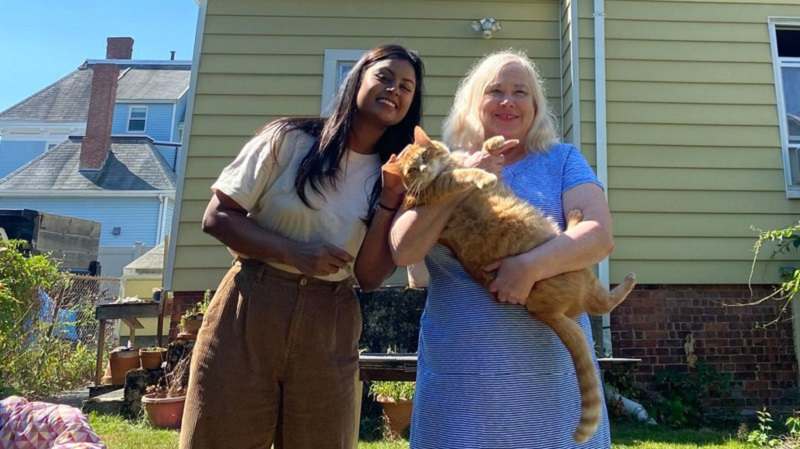
Nadia Abdullah, 25, with Judith Allonby, 64, holding Mango the cat, have been roommates in Malden, Mass., since May 2019.
13:34 JST, July 16, 2022
Nadia Abdullah was on the hunt for an affordable apartment in the Boston area a few months before she graduated from college.
“It was a little frustrating because I couldn’t find anything in my budget,” said Abdullah, 25, who was sharing on-campus housing with four other students until she graduated from Tufts University.
At the same time, Judith Allonby, 64, was debating whether to move out of her family’s old home in Malden, Mass., after her parents died. Her two-story house seemed too large for one person and it required a lot of upkeep, but she liked the neighborhood.
“I rely on public transportation,” said Allonby, an attorney.
Then she and Abdullah discovered an alternative: an intergenerational housing arrangement that would benefit them both.
While researching their options, they each learned about Nesterly, an online home-sharing agency that matches young renters with not-so-young people looking to supplement their incomes and share their space.
Abdullah and Allonby each passed the agency’s background check, then they were paired in an arrangement designed to fit their specific needs:
Allonby would rent the first floor of her home to Abdullah for $700 a month in exchange for help with the housework and gardening and occasional grocery runs. And Abdullah would get a safe and spacious place to live just six miles from Boston and a 30-minute drive from her robotics engineering job in Beverly, Mass.
“It was perfect – Judith has become like my family,” said Abdullah, who moved in with Allonby in late May 2019 and still lives there. “She even allowed me to adopt a cat. She now loves Mango as much as I do.”
Allonby said she was surprised at how compatible they turned out to be.
“It’s really nice to have somebody else around, and Nadia brings a different atmosphere and energy than I had with my 88-year-old mother,” she said. “Nadia is definitely not listening to Frank Sinatra.”
About 18% of Americans live in multigenerational households – meaning two or more adult generations – according to a study from Pew Research Center published this year. Such arrangements have quadrupled in the United States since the 1970s, with about 60 million U.S. residents now living with adults who are of a different generation, according to the study.
Contributing to that trend is that more young people are priced out of the housing market and more seniors want to age in place, said Donna Butts, executive director of Generations United, a D.C.-based organization that focuses on programs and policies that connect generations.
“Sometimes, just having somebody around to walk the dog and have a meal with a few times a week can make a huge difference for an older adult,” said Butts, noting that issues of loneliness and isolation doubled for seniors during the coronavirus pandemic.
College students faced a similar dilemma with many of their classes held online, she added.
“With young adults and older adults feeling the most isolated, connecting them is the right thing to do,” Butts said.
In the United States, several universities foster such arrangements, including Winona State University in Minnesota, Quinnipiac University in Connecticut and the University of California at Berkeley, which has an intergenerational housing program that started in 1986.
At Drake University in Des Moines, music students are given the opportunity to live rent-free at a local senior living center in exchange for performing several times a month for the residents.
Molly McDonough, a 22-year-old vocal performance major, recently moved into Wesley Acres, a senior living community that offers everything from independent apartment life to long-term care.
McDonough said it appealed to her because she was looking for a way to save money while living off campus. She now performs soprano arias from operas like “La Bohème” for seniors several times a month.
“It gives me some live performance practice and helps me save on rent at the same time,” she said. “I’ll be applying to graduate schools this fall and you have to pay a lot in fees, so this move made sense.”
She said she was happy to find a pleasant, one-bedroom apartment waiting for her last month on the center’s fourth floor.
“It came fully furnished, with towels, dishes and anything else I needed,” McDonough said. “They also allowed me to bring my two cats.”
There were a few surprising things in the apartment, including in the bathroom.
“I counted seven bars that were installed in the shower,” she said. “So that was a little different for me. And then my cats of course immediately started playing with the string that you pull for an emergency.”
McDonough now often shares meals with senior residents in the communal dining room and she enjoys hearing their life stories.
“They’ve lived such full lives and there’s a lot that I can learn from them,” she said. “They’re all really sweet and caring.”
Shortly after she moved in, she found a note on her door from Arlene DeVries, 81, who lives at Wesley Acres with her husband, Fred DeVries, 83.
“Arlene wanted to give me a tour of Wesley Acres and I found out she’d also been a voice major at Drake,” McDonough said. “Right away, we became good friends.”
DeVries was her biggest cheerleader when she won first place in her category at the National Association of Teachers of Singing competition in Chicago in early July.
“Molly is so talented and a lot of people who live here have limited mobility and don’t have the opportunity to go out much anymore,” said DeVries.
“We’re delighted to have her here,” she added. “It gives us all a lift to have someone younger living with us.”
In Canada, college students and seniors are moving in together, too.
Michael Wortis, 85, a retired physics professor from Burnaby, B.C., near Vancouver, said he was intrigued when he received an email last year from Simon Fraser University, where he’d taught for 15 years.
The university had recently started an intergenerational housing program with Canada HomeShare. Wortis, whose wife died of Alzheimer’s disease in 2015, decided that he could use a little help around the house, in addition to someone to chat with.
He was matched with Siobhan Ennis, 27, a health sciences graduate student who had been living with three roommates and was looking for some quiet study space.
In exchange for $400 a month to rent the bottom level of Wortis’s home, Ennis now mows the lawn and helps clean up around the house, and she and Wortis dine together several times a week. They also garden together and have movie nights.
“I don’t have the same amount of energy that I used to, and it’s nice to know that if I fall down the stairs, somebody will come home,” Wortis said.
As a bonus, Ennis makes terrific stir-fries, he said, and she’s better at figuring out problems with high-tech equipment than he is.
Ennis said she believes that she actually benefits the most from the arrangement.
“Michael is such a great person – I love having him as my roommate,” she said. “There is always something to talk about and he’s always direct and thoughtful. We’ll be friends for life.”
Nadia Abdullah said she feels the same.
“I’m engaged to be married now, and Judith allowed my fiance to move in with us,” she said. “Even when we move out on our own, the bond we have with her will always be there.”
Top Articles in News Services
-

Survey Shows False Election Info Perceived as True
-

Prudential Life Expected to Face Inspection over Fraud
-

Hong Kong Ex-Publisher Jimmy Lai’s Sentence Raises International Outcry as China Defends It
-

Japan’s Nikkei Stock Average Touches 58,000 as Yen, Jgbs Rally on Election Fallout (UPDATE 1)
-

Trump Names Former Federal Reserve Governor Warsh as the Next Fed Chair, Replacing Powell
JN ACCESS RANKING
-

Japan PM Takaichi’s Cabinet Resigns en Masse
-

Japan Institute to Use Domestic Commercial Optical Lattice Clock to Set Japan Standard Time
-

Israeli Ambassador to Japan Speaks about Japan’s Role in the Reconstruction of Gaza
-

Man Infected with Measles Reportedly Dined at Restaurant in Tokyo Station
-

Man Infected with Measles May Have Come in Contact with Many People in Tokyo, Went to Store, Restaurant Around When Symptoms Emerged























